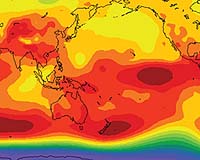| . |  |
. |
Paris (AFP) Feb 10, 2010 The Nobel-winning UN panel that serves as the scientific bedrock for global climate negotiations needs a serious makeover, several of its most senior members said Wednesday. Their recommendations included scrapping the panel, which is run by volunteers, and replacing it by a full-time staff or establishing a "Wikipedia-style" forum for swapping information and ideas on climate change. Of the five researchers who wrote in the journal Nature most agreed the panel's process was too laborious and some suggested its review of climate change be removed from government oversight to avoid any political interference. None, though, called for the removal of the group's chairman, Rajendra Pachauri, under fire for his stewardship and alleged conflicts of interest related to personal finances. Pachauri has denied any wrongdoing. Once unassailable, the Intergovernmental Panel on Climate Change (IPCC), which issued its first report in 1990, has been battered over the last three months. The IPCC comprises several thousand scientists tasked with vetting scientific knowledge on climate change and its impacts. They produce a major report every half-dozen years or so. The latest opus, the fourth in the series, was published in 2007. Governments also participate in the process, as they help to nominate experts and to approve a draft of the review. Ahead of the Copenhagen climate summit in December, the IPCC was rocked by the leaking of emails between some of its scientists that, according to skeptics, showed data had been skewed to mask contradictions about the evidence for man-made global warming. The allegations became an issue at the start of the UN talks but were dismissed by most scientists as distorted and politically motivated. At least one formal inquiry since then found no wrongdoing or unethical behaviour. More damaging to the IPCC's reputation have been errors uncovered in its mammoth 2007 report. A prediction that global warming would melt away the Himalayan glaciers that provide water to a billion people in Asia by 2035 has been dismissed by glaciologists as preposterous, and will be withdrawn. Another passage suggesting that natural disasters including hurricanes and floods had increased in number and intensity has also been challenged. Both assertions exaggerate the impacts of climate change and are based on sources that do not meet the IPCC's own standards of reliability, say critics. These and other problems show the need for root-and-branch reform, said Mike Hulme, a professor at Britain's University of East Anglia and a coordinating lead author of previous IPCC reports. "The IPCC needs a complete overhaul. The structure and process are past their sell-by dates," he wrote in a hard-hitting commentary. Hulme suggested dissolving the panel and setting up three separate bodies to take on its duties. The first would focus on hard science and issue short, timely and policy-relevant reports. A second would evaluate regional impacts, and the third would translate all the findings into specific policy options. Eduardo Zorita, a scientist at the GKSS Research Centre near Hamburg, Germany, called for the creation of a professional, independent climate body on the model of the International Atomic Energy Agency (IAEA), the International Energy Agency (IEA) or the US Congressional Budget Office. "The IPCC is currently experiencing a failure of trust that reveals flaws in its structure," pointing to a "blurring" of the space between politics and science, he said. For John Christy of the University of Alabama, the only way to avoid bias on the part of lead authors nominated by individual governments was to create a "Wikipedia-style" forum for open debate. "The IPCC would then be a true reflection of the heterogeneity of scientific views, an 'honest broker' rather than an echo chamber," he said. "The truth -- and this is frustrating for policy makers -- is that scientists' ignorance of the climate system is enormous," he added. "There is still much messy, contentious, snail-paced and now, hopefully, transparent work to do."
Share This Article With Planet Earth
Related Links Climate Science News - Modeling, Mitigation Adaptation
 The Asia-Pacific And Kyoto: In Conflict Or Cooperation
The Asia-Pacific And Kyoto: In Conflict Or CooperationWashington DC (SPX) Feb 10, 2010 President Obama's visit to China before December's Copenhagen conference underlined views that the international strategy to tackle climate change truly hinges on cooperation between the United States and the developing Asian economies. This relationship, as represented in the Asia-Pacific Partnership (APP), is controversial to environmental analysts. In two papers published in WIREs Clima ... read more |
|
| The content herein, unless otherwise known to be public domain, are Copyright 1995-2010 - SpaceDaily. AFP and UPI Wire Stories are copyright Agence France-Presse and United Press International. ESA Portal Reports are copyright European Space Agency. All NASA sourced material is public domain. Additional copyrights may apply in whole or part to other bona fide parties. Advertising does not imply endorsement,agreement or approval of any opinions, statements or information provided by SpaceDaily on any Web page published or hosted by SpaceDaily. Privacy Statement |